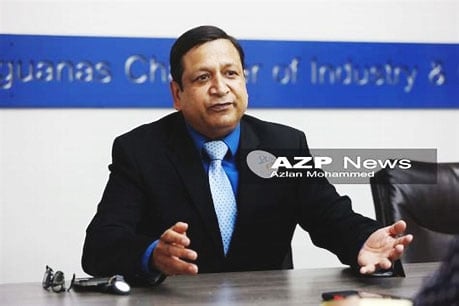So concerned have business leaders in Trinidad and Tobago become regarding the continually unfolding crime spree afflicting the twin-island Republic and its impact on the business community that the country’s business support organizations would appear to have adopted pushing back the targeting of business owners and premises as an absolute priority as the country’s policing resources appear to be seriously challenged in the effort to bring the situation under control. One of the latest crime-stopping recommendations put on the table by a high-profile member of the country’s business community is the recommendation made by President of the Chaguaramas Chamber of Industry and Commerce Baldath Maharaj and published in the Tuesday October 22 edition of the Trinidad Guardian that a state of emergency be implemented in those areas across the country which have become widely identified as crime “hotspots” throughout the country.
The recommendation from the one of the country’s senior private sector leaders sends an unmistakable signal that an ensuing crime spree that has particularly targeted business persons and premises over several months persists unabated and that a point has been reached where incrementally stringent measures must now be put in place to roll back the ‘disease.’ In effect, a state of emergency would empower the authorities to institute measures that would not normally apply in the interest of providing suitable responses to a crime-related environment that seriously compromises public safety. The application of a state of emergency, while known to compromise the customary ‘freedoms’ which the populace enjoys in democratic societies, operates on the basis that while, in some circumstances, remedial measures may not be altogether palatable ones, application of those measures are driven by the principle of the greater good.
Trinidad and Tobago has, over a protracted period, been the victim of a rash of crimes ranging from what, reportedly, are gang-related confrontations to the targeting of businessmen and women and business houses, on the whole. Comments by the citizenry and specifically by the business community strongly suggest that the scale of what is now regarded as a crisis is beyond the scope of the measures being applied by law-enforcement and that a point has been reached where additional measures need to be put in place. Observers of the prevailing crime spree in the CARICOM member country have pointed to the proliferation of high-powered firearms and what appears as an ‘appetite for taking lives’ as factors that made the crime spree in Trinidad and Tobago a national emergency.
Mindful, seemingly, not to advocate restrictive measures that may remove the customary prerogatives afforded the citizenry in democratic societies, the Chaguaramas Chamber President is reported as saying that the Chamber’s call for a state of emergency is limited to “crime spots” and would not affect businesses in general. At the same time, the Chaguaramas Chamber President is quoted in the Guardian report as saying that while “a state of emergency tends to go with a curfew and there is always some reduction in retail business and that is not good for our members either way,” the Chamber will support the measure anyway.








